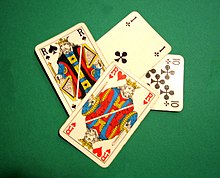
Pinochle, also called pinocle or penuchle, is a trick-taking, Ace-Ten card game typically for two to four players and played with a 48-card deck. It is derived from the card game bezique; players score points by trick-taking and also by forming combinations of characters into melds. It is thus considered part of a "trick-and-meld" category which also includes the game belote. Each hand is played in three phases: bidding, melds, and tricks. The standard game today is called "partnership auction pinochle".

Tarocchini are point trick-taking tarot card games popular in Bologna, capital city of the Emilia-Romagna region of Italy and has been confined mostly to this area. They are the diminutive form of tarocchi, referring to the reduction of the Bolognese pack from 78 to 62 cards, which probably occurred in the early 16th century.
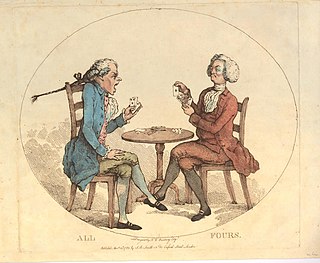
All Fours is a traditional English card game, once popular in pubs and taverns as well as among the gentry, that flourished as a gambling game until the end of the 19th century. It is a trick-taking card game that was originally designed for two players, but developed variants for more players. According to Charles Cotton, the game originated in Kent, but spread to the whole of England and eventually abroad. It is the eponymous and earliest recorded game of a family that flourished most in 19th century North America and whose progeny include Pitch, Pedro and Cinch, games that even competed with Poker and Euchre. Nowadays the original game is especially popular in Trinidad and Tobago, but regional variants have also survived in England. The game's "great mark of distinction" is that it gave the name 'Jack' to the card previously known as the Knave.

Spades is a trick-taking card game devised in the United States in the 1930s. It can be played as either a partnership or solo/"cutthroat" game. The object is to take the number of tricks that were bid before play of the hand began. Spades is a descendant of the Whist family of card games, which also includes Bridge, Hearts, and Oh Hell. Its major difference as compared to other Whist variants is that, instead of trump being decided by the highest bidder or at random, the Spade suit always trumps, hence the name.

Forty-fives is a trick-taking card game that originated in Ireland. The game is popular in many communities throughout Atlantic Canada as well as the Gaspé Coast in Québec. Forty-fives is also played in parts of Massachusetts and southern New Hampshire in New England, United States, as well as in the South Island of New Zealand.
Marjapussi is a traditional Finnish trick taking game for 4 players playing in 2 partnerships and is one of the Mariage family, its key feature being that the trump suit is determined in the middle of the play by declaring a marriage. There are variants of Marjapussi for two and three players.
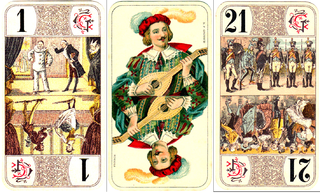
The game of French Tarot is a trick-taking strategy tarot card game played by three to five players using a traditional 78-card tarot deck. The game is the second most popular card game in France and is also played in French-speaking Canada. It should not be confused with French tarot, which refers to all aspects of cartomancy and games using tarot cards in France.
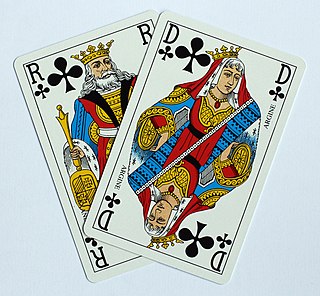
Belote is a 32-card, trick-taking, Ace-Ten game played primarily in France and certain European countries, namely Armenia, Bulgaria, Croatia, Cyprus, Georgia, Greece, Luxembourg, Moldova, North Macedonia, Bosnia and Herzegovina and also in Saudi Arabia. It is one of the most popular card games in those countries, and the national card game of France, both casually and in gambling. It appeared around 1900 in France, and is a close relative of both Klaberjass and Klaverjas. Closely related games are played throughout the world. Definitive rules of the game were first published in French in 1921.
Pedro is an American trick-taking card game of the All Fours family based on Auction Pitch. Its most popular variant is known as Cinch, Double Pedro or High Five which was developed in Denver, Colorado around 1885 and soon regarded as the most important American member of the All Fours family. Although it went out of fashion with the rise of Auction Bridge, it is still widely played on the western coast of the United States and in its southern states, being the dominant game in some locations in Louisiana. Forms of the game have been reported from Nicaragua, the Azores, Niobe NY, Italy and Finland. The game is primarily played by four players in fixed partnerships, but can also be played by 2–6 individual players.

Bid whist is a partnership trick-taking variant of the classic card game whist. As indicated by the name, bid whist adds a bidding element to the game that is not present in classic whist. Bid whist, along with spades, remains popular particularly in U.S. military culture and a tradition in African-American culture.
Pitch is the American name of the English trick-taking game of Blind All Fours which, in turn, is derived from classic All Fours. Historically, Pitch started as "Blind All Fours", a very simple All Fours variant that is still played in England as a pub game. The modern game involving a bidding phase and setting back a party's score if the bid is not reached came up in the middle of the 19th century and is more precisely known as Auction Pitch or Setback.
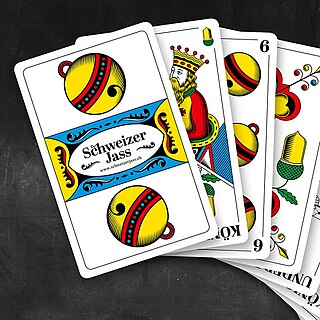
Jass is a family of trick taking, Ace-Ten card games and, in its key forms, a distinctive branch of the Marriage family. It is popular in its native Switzerland as well as the rest of the Alemannic German-speaking area of Europe, Italian South Tyrol and in a few places in Wisconsin, Ohio, California, Oregon and Washington USA.
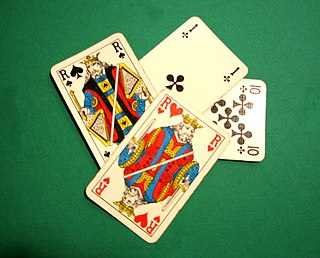
Clabber is a four-player card game played in southwestern Indiana near Evansville. It is a member of the Jack-Nine family of point-trick card games that are popular in Europe and is similar to Klaberjass. The trump makers must score at least eighty-two points to keep from "going set", where they don't score any of their points. Additional points can also be scored for a combination of cards in a hand, which would assist in "making it", or, not going set.

Brisca is a popular Spanish card game played by two teams of two with a 40-card Spanish-suited pack or two teams of three using a 48-card pack.

Klaverjas or Klaverjassen is a Dutch, four player, trick-taking card game that uses a Piquet pack of 32 playing cards. It is closely related to the internationally popular card game of Klaberjass. Klaverjas is one of the most popular card games in the Netherlands, traditionally played in cafes and social clubs. The game offers a considerable level of complexity and depth. It has numerous variants, but its basic rules are universal.
Smear is a North-American trick-taking card game of the All Fours group, and a variant of Pitch (Setback). Several slightly different versions are played in Michigan, Minnesota, Northern and Central Iowa, Wisconsin and also in Ontario, Canada.

Klaberjass or Bela is a trick-taking Ace-Ten card game that is most popular in German communities. In its basic form it is a 9-card trick-and-draw game for two players using a 32-card piquet pack.
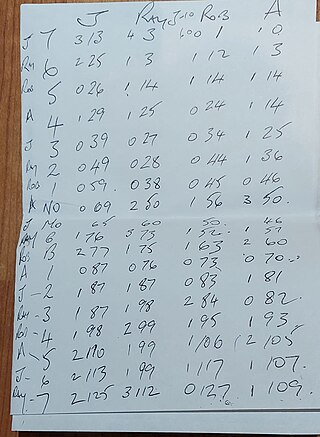
Clag is a trick-taking card game using a standard pack of 52 French-suited playing cards. It is similar to Oh Hell, and can be played by three to seven players. Clag originated in the Royal Air Force and started as an acronym for Clouds Low Aircraft Grounded.
Court piece is a trick-taking card game similar to the card game whist in which eldest hand makes trumps after the first five cards have been dealt, and trick-play is typically stopped after one party has won seven tricks. A bonus is awarded if one party wins the first seven tricks, or even all tricks. The game is played by four players in two teams, but there are also adaptations for two or three players.
Klammern is an Ace-Ten card game and variant of Jass, which is particularly widespread in the Alemannic region. It is played mainly in Switzerland, Liechtenstein, the Austrian state of Vorarlberg and in parts of southern Germany and Alsace. But the game is also finding more and more fans in the north-west of Germany, mainly in North Rhine-Westphalia. In Hamburg the game goes under the name Klapperjazz or Klapperjass and was initially played mainly by stevedores for "nen Heiermann", a 5 Mark piece. A die was used to keep score. In other parts of North Germany it is called Klappern or Klapper-Jas and was popular in the 1950s and 60s in pubs and bars and also among lorry drivers as they waited, for example, for customs clearance at Hamburg's free port.
